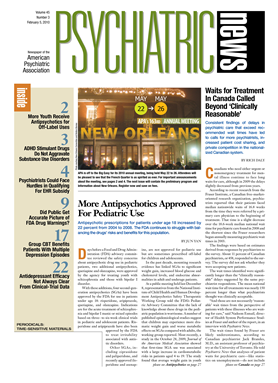Once I watched a film in which a pilot flew his single-engine plane into Venezuela's Angel Falls in a maniacal game of chicken. His copilot begged him to steer the aircraft away from the sea of rock that rose up and engulfed the horizon, but the pilot, obsessed with proving his point, pressed stubbornly on toward inevitable doom. As the men drew closer to the cliff, mist from the waterfall fogged the windshield, obscuring all hope. It seemed the point of no return had passed. This was the feeling I had going into the November 2009 APA Assembly meeting.
The economic adversity of the past two years drove many institutions to take desperate measures in the face of budget shortfalls, and APA is no exception. One unfortunate outcome of the economic downturn was the need to trim the Assembly budget by more than $200,000 for the 2010 fiscal year—an end that could be achieved only through radical changes to the Assembly structure and membership.
Assembly members had almost a year to develop a restructuring plan to accommodate budgetary restrictions while maintaining representation of APA's diverse membership, and there was no shortage of good ideas. Some proposed holding only one Assembly meeting a year instead of two; others suggested replacing APA's governance structure to make it similar to the one the AMA uses; others recommended reducing district branch representation in the Assembly; and still others proposed eliminating Assembly representation for allied psychiatric groups. In the months leading up to the November meeting, compelling arguments were made for each of these proposals, but there was no consensus on which solution would best preserve the representative function of the Assembly.
The lack of consensus had nothing to do with a lack of leadership, but reflected a problem inherent in any representative democracy: representatives must try to solve shared problems while protecting the unique interests of their constituents. This can be a difficult balance to strike, and unwillingness to compromise can lead to deadlock. At the opening of the November Assembly's first plenary session, a deadlock seemed certain as members of each faction stood their ground. But most members recognized that the Assembly could not survive without restructuring. A mountain loomed ahead, and if we could not reach a consensus, we would crash into it.
A reference committee was appointed and charged with reviewing the restructuring proposals, many of which contained overlapping provisions or were contingent upon one another being enacted. To debate each one separately would have taken weeks. In a stroke of brilliance, the reference committee decided not to accept, reject, or amend each proposal individually. Rather, committee members drew upon each proposal and synthesized a restructuring proposal of their own. Following heated debate on the Assembly floor, this proposal proved to be an acceptable compromise and was passed by a two-thirds majority vote by strength.
Under this plan, the Assembly will use an increased ratio of APA members to Assembly representatives for each district branch and eliminate Assembly funding for deputy representatives to attend the Assembly's two yearly meetings, though the deputy reps will remain part of the Assembly as unfunded members and can attend at their own expense.
These changes represent a significant sacrifice for everyone in the Assembly. For example, the three states that have more than one district branch—California, Missouri, and New York—face a reduction in the numbers of Assembly representatives, though Assembly membership in each state will still be allocated based on the number of APA members in each state. The Assembly Committee of Member-in-Training Representatives (ACOM)—the residents and fellows who sit on the Assembly—made a large sacrifice as well. We too lost funding for our deputy representatives, even though we are the members least able to pay our own way to future meetings, which will be required of any deputy reps who want to attend future Assembly meetings.
But sacrifice is not the only hallmark of compromise, and in this case the benefit that accrues to every APA member is that the Assembly will continue to exist. We did not crash into a mountainside. APA members from every district branch, including early career psychiatrists and those who belong to minority or under-represented groups, will continue to have their interests prominently represented in APA governance. As chair of ACOM, I am proud of residents' role in reaching this compromise and glad that the interests of residents and fellows will continue to be represented.


